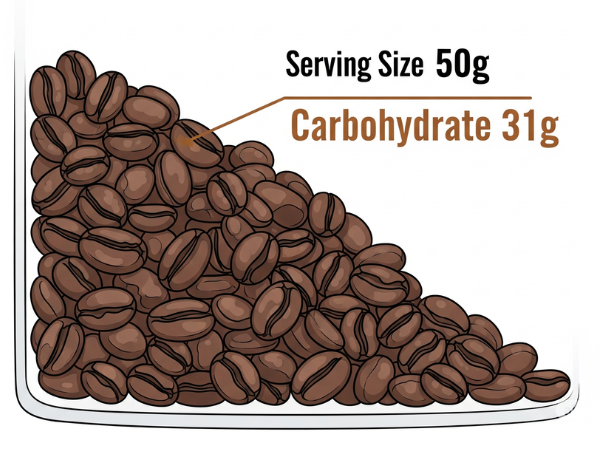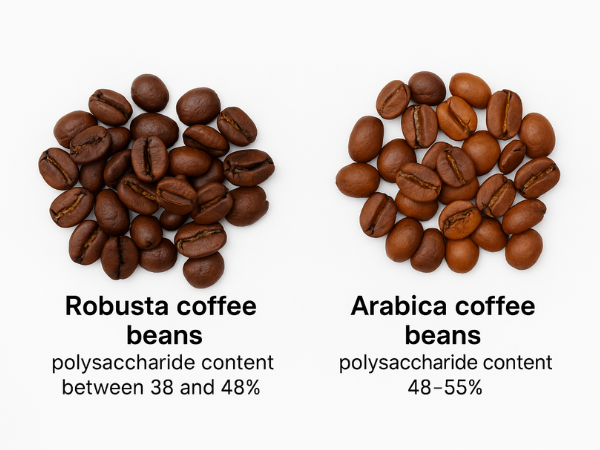You might be surprised to learn that the type of coffee bean and its preparation method can significantly impact its carb content.
This guide we’ll explore which coffee beans have the most carbs, breaking down the differences between raw, roasted, and other varieties.
Understanding Coffee Bean Basics: Initial Composition
Different types of coffee beans contain varying amounts of carbohydrates. These differences can influence the flavor, aroma, and overall experience of your coffee.
The Anatomy Of A Coffee Bean
Coffee beans are actually seeds found inside coffee cherries. They go through several stages before becoming the brew we enjoy.
- Outer Layer: The parchment layer protects the seed.
- Seed: This is the part we call the coffee bean.
- Inner Layer: Contains oils and other compounds.
Coffee beans are primarily composed of carbohydrates, lipids, proteins, and water. Carbohydrates make up the largest portion by dry weight in raw beans.
Carbohydrates In Green (Unroasted) Beans
Green coffee beans contain a significant percentage of carbohydrates, including sugars and polysaccharides. A typical 50g serving of raw beans can contain around 31g of carbohydrates.
Carbohydrates in green beans break down into two main types:
- Sugars: Simple carbohydrates that contribute to sweetness.
- Polysaccharides: Complex carbohydrates that add to the body and mouthfeel of coffee.
This carbohydrate content varies among different coffee varieties. Factors such as growth conditions and processing methods also play a role.

The Transformation: How Roasting Affects Carb Levels
The roasting process transforms raw coffee beans, changing not just their taste but also their nutritional composition. Let’s explore how these transformations occur.
Carbohydrates In Raw Vs. Finished Beans
Raw coffee beans contain a notable amount of carbohydrates. These carbs are primarily in the form of polysaccharides. As the beans undergo the roasting process, chemical reactions break down some carbohydrates. Here’s a closer look:
Raw Beans:
- Average carbohydrate content: 50-60% by weight.
- Mostly polysaccharides, providing energy.
Roasted Beans:
- Average carbohydrate content: 30-40% by weight.
- Some carbs lost during roasting.
- New compounds created, enhancing flavor.
Overall, while some carbs are lost during roasting, the impact on net carbs in a typical serving of brewed coffee is minimal. The focus shifts from carbs to flavors and aromas.
Light Vs. Dark Roasts: Carb Nuances
Light and dark roasts are popular choices among coffee lovers. Here’s how roasting affects their carb content:
Light Roasts:
- Less exposure to heat.
- Higher retained carbohydrate levels.
- Brighter flavors, more acidity.
Dark Roasts:
- Longer exposure to heat.
- Slightly greater reduction in total carbohydrates.
- Rich, bold flavors, less acidity.
The roasting process causes chemical reactions that lead to caramelization and Maillard reactions. These processes contribute to flavor and color changes.
Exploring Different Coffee Bean Varieties And Carb Content
Exploring various coffee bean varieties helps us understand how carbs play a role in each type. The most common types are Arabica and Robusta. Each has unique characteristics that affect their carbohydrate content.

Arabica Vs. Robusta: A Carb Comparison
Arabica and Robusta beans are the most popular types of coffee. They have different carbohydrate levels, impacting flavor and health benefits.
| Coffee Bean Type | Carbohydrate Content | Flavor Profile |
|---|---|---|
| Arabica | 48-55% polysaccharides | Smoother, sweeter |
| Robusta | 38-48% polysaccharides | Bolder, sometimes bitter |
Arabica beans generally contain a higher carbohydrate content, between 48-55% polysaccharides. This difference in carbohydrate composition contributes to Arabica’s smoother and sweeter flavor profile.
On the other hand, Robusta beans, while higher in caffeine, typically have fewer carbohydrates, leading to a bolder and sometimes more bitter taste.
Decaffeinated Coffee Beans: Carb Implications
The decaffeination process itself has minimal impact on the carbohydrate content of the beans. Therefore, decaf coffee beans, and the brewed coffee made from them, will have similar carb levels to their caffeinated counterparts.
Most decaffeinated coffee will contain around 0-1 gram of carbohydrates per serving.
- Decaf coffee offers similar flavors to regular coffee.
- Great option for those avoiding caffeine.
For those monitoring their carb intake, decaf coffee provides a satisfying choice without major differences in carbohydrates. It allows coffee lovers to enjoy their drink without the jitters associated with caffeine.
Practical Considerations For Your Dietary Choices
Practical considerations for your dietary choices include how the type of coffee bean and preparation method affect the overall carbohydrate content.
Carbohydrate Content In Your Cup
Brewed black coffee, regardless of bean type or roast, contains virtually no carbohydrates. Typically, it has less than 1 gram per serving. The vast majority of bean carbohydrates remain in the spent grounds. Here’s a quick overview of the carbohydrate content:
| Type of Coffee Bean | Carbohydrate Content (per 100g) |
|---|---|
| Raw Coffee Beans | 13-17g |
| Roasted Coffee Beans | 0-5g |
| Brewed Coffee | 0-1g |
Keep in mind that additions like milk, sugar, and syrups are the main source of carbs in coffee beverages. If you enjoy flavored coffee drinks, check their nutritional information.
Coffee Beans In A Low-carb Lifestyle
For those on strict low-carb or ketogenic diets, black coffee is an ideal beverage choice. It fits well into a low-carb lifestyle since it contains minimal carbs. Here are some tips for including coffee in your diet:
- Stick to brewed black coffee for the lowest carb option.
- Choose whole roasted beans for snacking in moderation.
- Avoid sweeteners and syrups to keep carbs low.
- Always factor in any added ingredients when tracking carbohydrate intake.
By focusing on the type of coffee you consume and how you prepare it, you can enjoy your favorite beverage without compromising your dietary goals.
